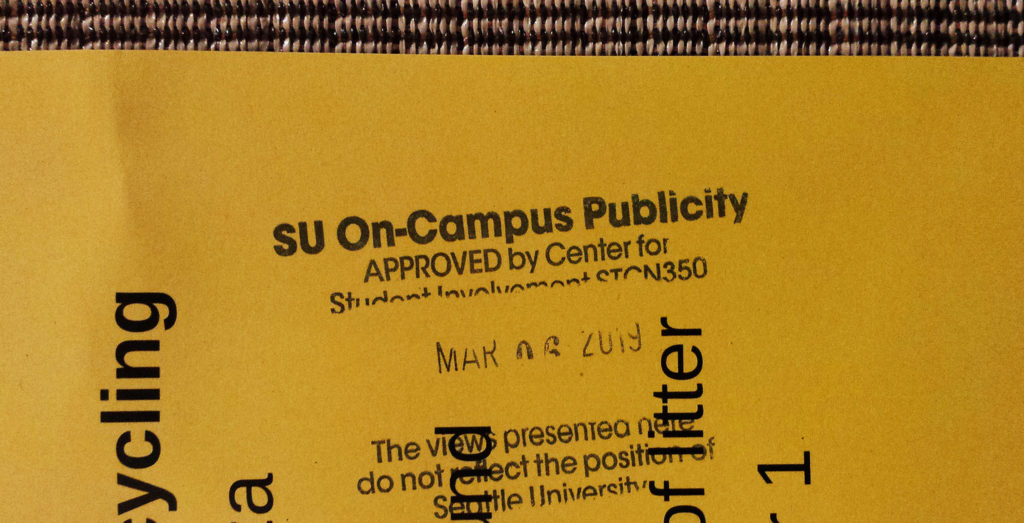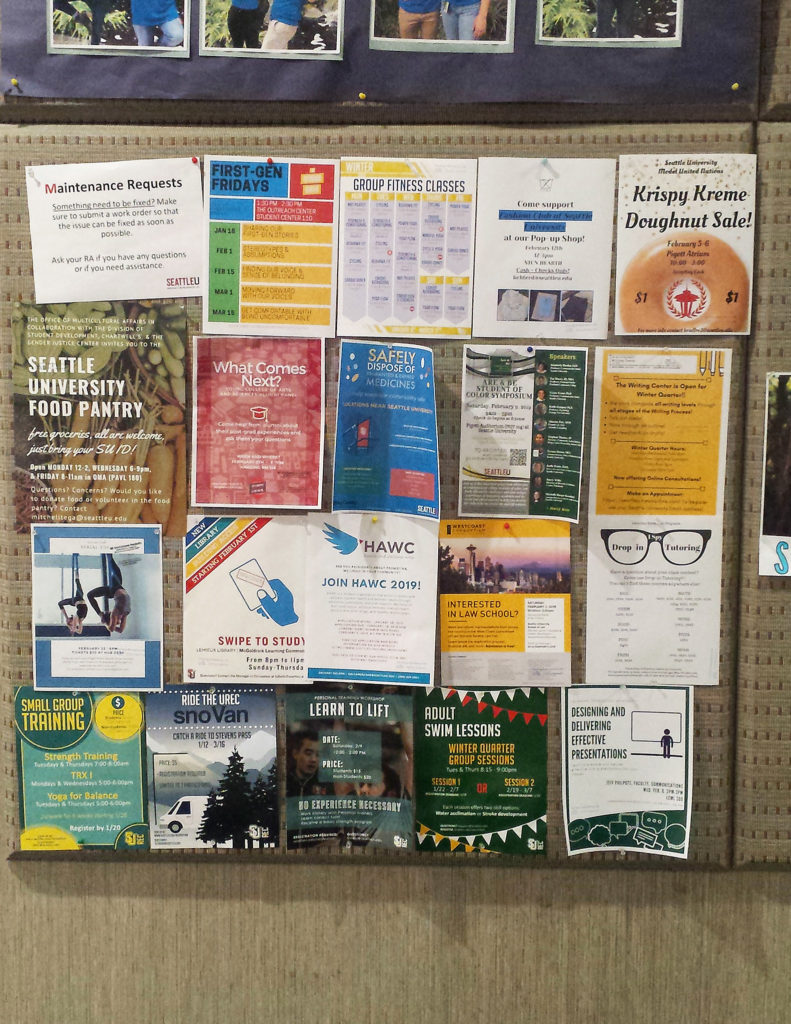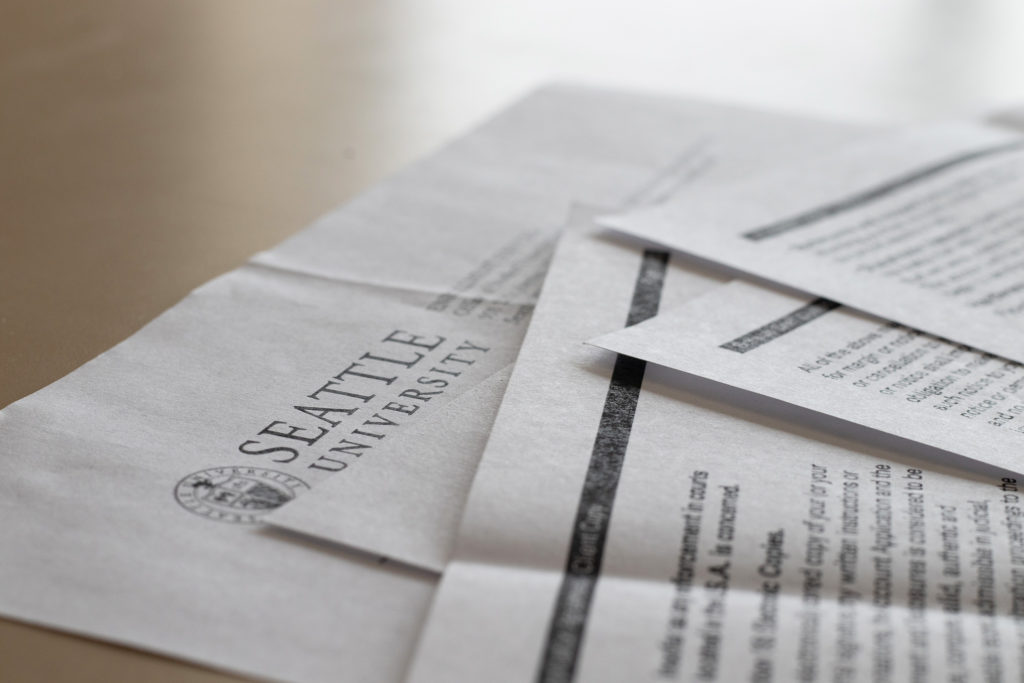Student activists and faculty members are questioning Seattle University’s administration and calling for changes on the university’s willingness to empower leaders, after it summoned three student activists and two organizational leaders for an Integrity Formation hearing for posting fliers in residence halls.
Students Jo Bechtold, Connor Crinion, Erin Alberts, and Emily Reinl received a notice of Organizations Review Board and individual Integrity Formation hearings on Jan. 28 to take place on Feb. 1. The notice indicated violations of the Student Code of Conduct due to flyering of the student dormitories.

Seattle University Center for Student Involvement places dated stamps only on posters they have approved to be displayed.
The fliers were in reference to the event “Do the Police Keep Us Safe?” which took place on Jan. 24 in the Student Center. The event was put together by a coalition of student leaders and co-sponsored by the departments of anthropology and sociology. The students came together as friends and individuals who wanted to raise awareness for this conversation.
The focus of the event was to educate students on what to do in a non-emergency situation and alternatives to consider before calling the cops. The coalition hosting the event hoped to foster a space where individuals could ask questions and learn from one another.
Due to the process of event planning at Seattle U, they were required to fill out a Student Event Form and record specific details on who would be involved. The event was booked by Reinl—a fourth-year psychology and Spanish major—under the organization White Students Against Racism (WSAR). However, because Alberts, a fourth-year psychology major, was listed as president of the organization on Connect SU, she also received a notice, even though their organization practices horizontal leadership.
“I think this incident is the last in a long line that has made me much more critical of the school.”
After planning the event, a decision was then made to flyer the residence halls with information regarding the event in an attempt to advertise and bring awareness to students on the subject matter and the event taking place.
The student activists had other flyers and posters on campus approved by the Center for Student Involvement. Crinion, a fourth-year public affairs and sociology major, allowed his friends to use his email address because an official requirement calls for an email to be present on the advertisements. This is why he believes he received a notice and was brought into the hearings.
Crinion has been involved in student activism on campus for the majority of the time he has spent at Seattle U and has noticed a change in how the university handles demonstrations.
“I think this incident is the last in a long line that has made me much more critical of the school, and it’s unfortunate that I’m pessimistic of this university and its commitment to its stated values,” Crinion said.
A faculty member received concerns from Integrity Formation that displayed concerns of content, leading the students to believe that the charges were related to the content of the fliers rather than the actual act of flyering. The office stated they wanted to meet up with the advisors and students involved with the event but then backtracked on their desire to meet and said they would follow up with the individuals through the Integrity Formation process.
All the students involved were then notified that they would need to attend integrity hearings on Feb. 1. Bechtold, a third-year social work major and president of the club Reignite the Mission, was to attend on behalf of this organization. She noted her frustration within the process, as she did not have ill intentions in supporting the organization or attending the event.
Bechtold shared the event to the Reignite the Mission Facebook page and did not have any intent of misrepresenting or misleading students on who would be present at the event. She simply wished to inform others that the event was taking place.
“I am a low-income student, I work two other jobs, and I was very frustrated with this process because I feel like they were trying to take up our time, energy, and resources to distract us from the real work that needs to be done,” Bechtold said.
Alberts was to attend on behalf of WSAR. She attended the event as a supporter, friend, and interested individual, but had no part in the planning nor flyering. She states that she had not been active within the organization for a while because of schoolwork and personal reasons, but she is now motivated to be more involved.
Alberts believes that Seattle U is trying to suppress the student organization.
“This has made me want to get even more involved,” Alberts said, “What they are doing is counterintuitive because instead of breaking apart the club they are pulling us closer together to work more on exposing how the school is stifling student activism.”
Reinl, however, was recognized when placing flyers under students’ doors. They also were the one to book the room under WSAR. Reinl received an individual notice for themself and another for WSAR.
“It was confusing because I couldn’t understand which questions were individually [directed] towards me or the organization,” Reinl said. “There are inconsistencies that make the school seem like the administration is against students and faculty, rather than prioritizing student activism.”

A wall of approved posters for Seattle University clubs in the lobby of Bellarmine Hall.
The students described the hearings as trials rather than conversation between two individuals, with five to seven people present to represent the university. Conversely, the students were only allowed to have one other individual with them. This individual is required to remain silent and observe as a supporter but could take notes throughout the hearing.
Following the hearings, one student was found not guilty of the allegations against them, two students were found guilty for certain violations regarding their organization, and one student was found guilty for violations regarding them individually and as a part of their organization.
Sanctions given to the students involved campus access restrictions, disciplinary warnings, and directions to write an apology letter on behalf of the student, individually as well as as an organization, which will then be forwarded to those affected by the flyering.
The students expressed their concern with the dichotomy between what is being taught to them from the administration and their professors in the classroom.
“The administration and what we’re learning in the classroom is extremely different, and they’re not linking up. Admin preaches to ‘create leaders for a just and humane world,’ but they’re not allowing us to do that on this campus,” Alberts said. “We’re learning to be active in our everyday lives, but when we do, we get hearings, and this shows how hypocritical the school is when allowing student voices to be heard.”
Many faculty members were deeply concerned that the hearing took place, and a group of faculty sent a letter to those in charge of the Integrity Formation hearings. A few faculty members began to collaborate on a letter, while others weighed in and had input so that the letter could be edited to include multiple different perspectives.
Dean Spade, an associate professor in the school of law, took part in drafting the letter. He shared a concern for the actions taking place against the student activists and contributed to the letter.
“Right away I felt concerned that this was happening to students and began to advise them and talk to other faculty about this concern,” Spade said. “We decided to create a sign-on letter where we could raise our concerns on the inappropriate response from the University to student organizations.”
Rachel Luft, associate professor of sociology, also assisted in drafting this letter. Luft and other faculty members made it clear that they were concerned with the increasing overreach of the Dean of Students in student activism on campus.
“Students are doing exactly what we encourage them to do on campus which is to think for themselves, be engaged, encourage social justice among their peers, and take a stand by sharing information,” Luft said. “I find the response out of proportion with the alleged violation when they were doing what many of us encourage them to do in our classes.”

Students were left to prepare for their hearings and find information to present in their defense.
A significant amount of Seattle U’s faculty members signed the letter as they were not content with the events taking place before them. 47 individual members and two entire departments totaled in 61 signatures. Luft noted that many more faculty members have reached out, but were unable to sign before the letter was sent.
Luft added that the faculty has received acknowledgment from Provost Shane Martin stating that he has read it, is concerned, and will get back in touch with the faculty soon.
“It is a really good sign in the way that the new provost will be interested in faculty input, so I look forward to his response,” Luft said. “We feel heartened he is taking this seriously.”
Faculty hopes that internal and external reform of the Office of the Dean of Students will take place. They also request that the university be notified when changes are made to the Student Code of Conduct so that a shared government process is implemented and request for members who have experience and expertise be included in issues regarding student activism, civic engagement, and social justice.
“As student activists, we think it’s really important that the university doesn’t really protect or care about students in a lot of senses,” Crinion said. “Their priority seems to be to regulate, monitor, and disorganize students, and these integrity hearings are an example of that.”
The Spectator reached out to individuals working at the Office of Integrity and Formation for comment, but the office declined to respond to any questions regarding the cases that could potentially impact the confidentiality or privacy of the student records.
Myrea may be reached at
mmora@su-spectator.com















